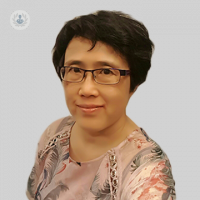Breast cancer awareness: from signs and symptoms to reducing risk
Written in association with:Breast cancer is a cancer of the breast tissue which will affect around 1 in 8 women (and a small number of men) at some point in their lifetime*. October is breast cancer awareness month and pink ribbons will be on display across the globe and Miss Christina Choy, a leading London-based breast surgeon, offers her expertise on the disease. Here she discusses the signs and symptoms of breast cancer, as well as treatments, diagnosis, risk factors and more…

Breast cancer symptoms
One of the primary signs of breast cancer is the presence of a lump in either breast or a thickening of an area of breast tissue. It is worth noting that the vast majority of breast lumps are not cancerous, but should be checked by a doctor. Other breast cancer symptoms may also be present and changes to the breasts can indicate the presence of the breast cancer. A change in skin texture (such as dimpling) or size or shape of the breast may occur. In addition, changes to the nipple may occur, such as a sunken nipple, or a rash appearing on or around it. A swelling around the collarbone or the armpit could also be indicative of breast cancer, as can a discharge from the nipple, sometimes containing blood.
Breast cancer diagnosis
Breast cancer screening is usually done by a mammogram or an ultrasound. A mammogram involves taking an x-ray, or multiple x-rays, of the breast to detect abnormalities. An ultrasound uses high-frequency sound waves through the tissue to create an image of the breast and can indicate the presence of a tumour. One or both can be used depending on circumstances.
If the result of screening is inconclusive, the patient may be sent for a biopsy to diagnose breast cancer. This involves taking a sample of the suspicious area for analysis in a lab and is the only way a diagnosis of breast cancer can be made. It is worth noting that even the majority of cases that get sent for a biopsy prove not be breast cancer.
Breast cancer treatment
There are a number of different factors that influence the way breast cancer is treated and managed. The age and general health of the patient is taken into account, as are myriad other factors including the stage and type of cancer, where in the breast the cancer is and whether or not the cancer has spread. Ideally, a patient should be treated by a multidisciplinary team (MDT) consisting of a range of specialists. In most cases surgery is the first port of call, followed by chemotherapy, radiotherapy or possibly by hormone or biological treatments.
Depending on the individual or the extent of progression of the disease, the extent of the surgery can vary. A mastectomy involves the removal of one or both of the breasts. In some cases it may only be necessary, or the patient may choose, to have a lumpectomy. In such cases only part of the breast tissue is removed.
On the whole, breast cancer survival rates extremely good for cases that are caught early on.
Breast cancer risk factors and prevention
Maintaining a healthy weight and a healthy diet, and cutting down on alcohol and saturated fats all seem to reduce the risk of breast cancer. Certain factors are however beyond the control of the individual; age is a determining factor and the risk increases as a person gets older. Genetics also play an important role in determining risk and indeed those with a family history of the disease may be at an increased risk. Genetic tests can be done to establish those who are at a particularly high risk of contracting the disease. In some cases, a person may opt to have a preventative (or prophylactic) mastectomy before contracting breast cancer. Medications are also available that are designed to prevent the disease, although they often have side effects.
Tips to reduce the risk of breast cancer
A few simple changes to your diet and lifestyle may reduce your risk of breast cancer and promote general health and well-being. Try the following tips;
General advice
- Limit alcohol consumption to a maximum of one glass of wine per day
- Optimise body weight and undertake regular exercise (20 minutes daily)
- Minimise the intake of red meat, processed meat, animal fat, sugar and sweets
- Expose your skin to natural sunshine for 20 minutes daily
- Increase the intake of olive oil, garlic, onions, leafy vegetable and fruits especially cherries, berries and pomegranate
Supplements
- Vitamin D3 (1,000 IU daily or 10,000 IU once weekly)
- Omega 3 (1-2 grams daily)
Specific Nutrients
- Flaxseed
- Polyphenols (green tea and fruits)
- Genistein (soybean in moderation)
- Curcumin (turmeric)
- Resveratrol (red grapes, raspberries and blueberries)
- Sulforaphane, Indole3 carbinol and thiocyanate (cruciferous vegetables such as cabbage, sprouts, broccoli, kale and cauliflower)
- Lactobacillus (Low fat natural yoghurt)
- Caffeinated coffee
Suggestion: why not try blending drink of fresh orange juice, Kale, blueberries & raspberries?
*Source: Cancer Research UK


